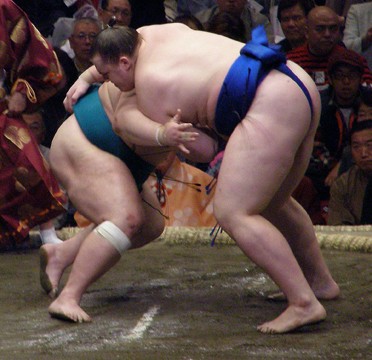| Nagoya Nears Eric Blair |


 |
| Rikishi of Old Joe Kuroda |

 |
| Heya Peek Barbara Ann Klein |


 |
| SFM Interview Mark Buckton |

 |
| Sumo 101 Barbara Ann Klein |
 |
| Photo Bonanza See the Natsu |
 |
| Natsu Basho Summary Lon Howard |

 |
| Lower Division Rikishi Mikko Mattila |

 |
| Nagoya Ones to Watch Mark Buckton |
 |
| Kimarite Focus Mikko Mattila |

 |
| Amateur Angles Howard Gilbert |

 |
| Sumo Game Bruce Rae |
 |
| Sumo in Print Barbara Ann Klein |
 |
| Kokugi Connections Todd Lambert |

 |
| Fan Debate Facilitator – Lon Howard |

 |
| SFM Cartoons Benny Loh & Stephen Thompson |
| Let’s Hear From You What was it that |


 |
| Readers’ Letters |
 |
Sumo Quiz
The Quizmaster
Answer the Qs and win yourself next basho’s banzuke.
It is highly recommended that readers dig into the sumo archives to review the bout where Aminishiki puts osakate on display in such textbook form that it really demonstrates what the technique is all about. When you watch that day 8 bout in the 2005 Kyushu basho between Aminishiki and Takamisakari, you will see the definitive execution of the osakate technique. In the bout, Takamisakari gets both hands inside and forces Aminishiki to the edge with his very superior position. Aminishiki is completely upright as he arrives on the tawara but he uses his right hand outside grip to swing Takamisakari around and out of the dohyo while bending backwards on the edge of the dohyo – a perfect exhibition of osakate. Osakate has been performed less than 10 times in all divisions since its implementation.
Harimanage has been seen four times in makuuchi since 1990.
Kyokushuzan often pulls his foe and yanks him around quite a bit and it is actually quite surprising that he has only registered one harimanage win. In the bout against Tochinonada on day 15 in the 2003 Haru
Home

Baruto wins with harimanage (photo by Barbara Ann Klein)
